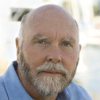Craig Venter

Craig Venter
John Craig Venteris an American biotechnologist, biochemist, geneticist, and entrepreneur. He is known for being one of the first to sequence the human genome and the first to transfect a cell with a synthetic genome. Venter founded Celera Genomics, The Institute for Genomic Researchand the J. Craig Venter Institute, and is now CEO of Human Longevity Inc. He was listed on Time magazine's 2007 and 2008 Time 100 list of the most influential people in the world. In 2010, the...
NationalityAmerican
ProfessionScientist
Date of Birth14 October 1946
CountryUnited States of America
People equate patents with secrecy, that secrecy is what patents were designed to overcome. That's why the formula for Coca-Cola was never patented. They kept it as a trade secret, and they've outlasted patent laws by 80 years or more.
We have 200 trillion cells, and the outcome of each of them is almost 100 percent genetically determined. And that's what our experiment with the first synthetic genome proves, at least in the case of really simple bacteria. It's the interactions of all those separate genetic units that give us the physiology that we see.
We have trouble feeding, providing fresh, clean water, medicines, fuel for the six and a half billion. It's going to be a stretch to do it for nine.
Agriculture as we know it needs to disappear. We can design better and healthier proteins than we get from nature.
Sometime in the future, I am a hundred percent certain scientists will sit down at a computer terminal, design what they want the organism to do, and build it.
Most people don't realize it, because they're invisible, but microbes make up about a half of the Earth's biomass, whereas all animals only make up about one one-thousandth of all the biomass.
Genome design is going to be a key part of the future. That's why we need fast, cheap, accurate DNA synthesis, so you can make a lot of iterations of something and test them.
It appears that the human genome does indeed contain deserts, or large, gene-poor regions.
We can do genetics. We can do experiments on fruit flies. We can do experiments on yeast. It's not so easy to do experiments on humans. So, in fact, it helps us, to interpret our own genetic code, to have the genetic code of the other species.
Intellectual property is a key aspect for economic development.
I am absolutely certain that life can exist in outer space, move around, find a new aqueous environment.
I see, in the future, bioengineered almost everything you can imagine that we use.
Traditional ways of distinguishing populations are irrelevant in terms of genetic code.
Traditional autobiography has generally had a poor press. The novelist Daphne du Maurier condemned all examples of this literary form as self-indulgent. Others have quipped that autobiography reveals nothing bad about its writer except his memory.